Over the weekend I got a call from the wife of a local shop owner who at one time did repairs, he worked well into his late 80's before finally calling it quits and moving everything from his shop to the basement of his home. He did mostly TV and Radio repairs with a big emphasis on Ham radio and vintage receivers.
Over the past few years I've missed his not being there when it came to small parts since he often saved me having to order a bunch of small parts by mail. He kept parts in bulk, and over the years had bought out others who did the same. He passed about 5 years ago or so and since then his wife, who was 20 years his junior, pretty much just locked up the basement and forgot about it.
The reason for her calling was to see if I would be willing to take all his stuff so she could sell the house.
Before I realized what all it was about to entail, I says sure, I'll be right over to take a look. I hopped in my truck and headed over there.
Two hours later I was on the third trip and hooking up my trailer.
90% of it all is small parts, resistors, transistors, capacitors, diodes, etc. plus a few hundred small assortments, plus things he bought in bulk in larger cabinets.
Plus all the shop equipment.
Most of the shop equipment is just older versions of what I already have, so nothing special there, but the having the parts on hand is going to be nice.
The issue is that he really didn't seem to have things very well sorted or organized. There's duplicate assortments throughout the lot of cabinets.
For instance there's 159 60 drawer organizers, with five being full of 1/8 and 1/4w resistors, five full of Mosfets, 12 full of small transistors, plus a ton of 12 and 15 drawer kits of the same. He had them stacked all around his work area, the walls of a 20x30ft area were covered in his basement.
There area also a good many larger cabinets, roughly 4x12" drawers full of various parts as well.
What I'm thinking is to reallocate those larger cabinets to consolidate the smaller assortments?
The way it is now is a haphazard confusing mess, with some organizers having a mix of parts with no meaningful purpose that I can see other than he found and empty drawer and filled it. I'm betting that he had so many duplicate assortments because he couldn't find anything when he needed it.
I'm basically looking for suggestions as to how to sort it all out and maybe make it take up less space. Having assortments with 5 or 10 pieces in each drawer makes no sense if it takes up so much space. What I'm thinking is using the larger drawers to separate similar value components with dividers so for example, if I need a 200Ω resistor, I'd go to the 200-250Ω drawer or similar vs digging through 10 or 20 smaller assortment boxes but then there's different type of resistors here too, carbon film, metal film, ceramic, carbon comp, etc. The ranges are pretty thorough as well.
I would sort caps by type vs value, mostly for space but the electrolytics will take more space then do the ceramic caps etc.
The smaller assortment boxes seem like they'd be better suite for diodes and items that take less space to sort. There just aren't as many diodes as there is resistors, transistors and caps.
Here's a few pics of what I'm dealing with.
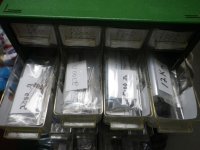
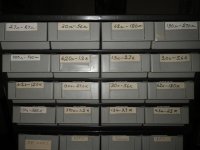
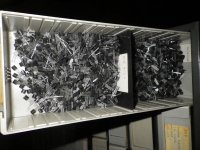
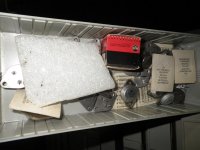
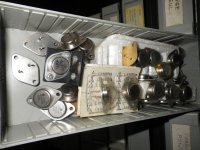
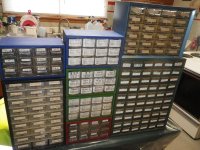
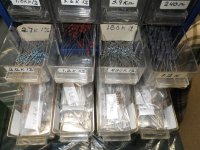
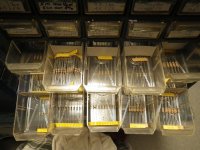
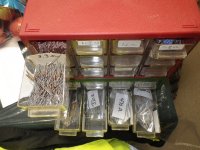
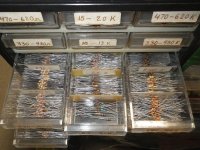
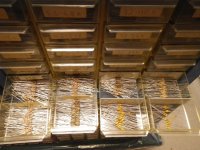
Over the past few years I've missed his not being there when it came to small parts since he often saved me having to order a bunch of small parts by mail. He kept parts in bulk, and over the years had bought out others who did the same. He passed about 5 years ago or so and since then his wife, who was 20 years his junior, pretty much just locked up the basement and forgot about it.
The reason for her calling was to see if I would be willing to take all his stuff so she could sell the house.
Before I realized what all it was about to entail, I says sure, I'll be right over to take a look. I hopped in my truck and headed over there.
Two hours later I was on the third trip and hooking up my trailer.
90% of it all is small parts, resistors, transistors, capacitors, diodes, etc. plus a few hundred small assortments, plus things he bought in bulk in larger cabinets.
Plus all the shop equipment.
Most of the shop equipment is just older versions of what I already have, so nothing special there, but the having the parts on hand is going to be nice.
The issue is that he really didn't seem to have things very well sorted or organized. There's duplicate assortments throughout the lot of cabinets.
For instance there's 159 60 drawer organizers, with five being full of 1/8 and 1/4w resistors, five full of Mosfets, 12 full of small transistors, plus a ton of 12 and 15 drawer kits of the same. He had them stacked all around his work area, the walls of a 20x30ft area were covered in his basement.
There area also a good many larger cabinets, roughly 4x12" drawers full of various parts as well.
What I'm thinking is to reallocate those larger cabinets to consolidate the smaller assortments?
The way it is now is a haphazard confusing mess, with some organizers having a mix of parts with no meaningful purpose that I can see other than he found and empty drawer and filled it. I'm betting that he had so many duplicate assortments because he couldn't find anything when he needed it.
I'm basically looking for suggestions as to how to sort it all out and maybe make it take up less space. Having assortments with 5 or 10 pieces in each drawer makes no sense if it takes up so much space. What I'm thinking is using the larger drawers to separate similar value components with dividers so for example, if I need a 200Ω resistor, I'd go to the 200-250Ω drawer or similar vs digging through 10 or 20 smaller assortment boxes but then there's different type of resistors here too, carbon film, metal film, ceramic, carbon comp, etc. The ranges are pretty thorough as well.
I would sort caps by type vs value, mostly for space but the electrolytics will take more space then do the ceramic caps etc.
The smaller assortment boxes seem like they'd be better suite for diodes and items that take less space to sort. There just aren't as many diodes as there is resistors, transistors and caps.
Here's a few pics of what I'm dealing with.











ack my OCD would be off the deep end!
i went through something similar years back when cleaning out the service department of a local music store that had every brand under the sun ( Ampeg, Fender, Gibson, Traynor etc etc along with Hammond organs) and was also an audio video and TV retailer and servicer.
i.m still sitting on a drawer of Leslie belts...
all i can tell you is that as daunting as it seems now as you go through your new found treasure and start to get familiar with what's there it will get better.
there always the option of drop shipping it all to me
i went through something similar years back when cleaning out the service department of a local music store that had every brand under the sun ( Ampeg, Fender, Gibson, Traynor etc etc along with Hammond organs) and was also an audio video and TV retailer and servicer.
i.m still sitting on a drawer of Leslie belts...
all i can tell you is that as daunting as it seems now as you go through your new found treasure and start to get familiar with what's there it will get better.
there always the option of drop shipping it all to me
Zip lock plastic bags in akro bins is much more compact. I sort resistors first by wattage (.3-.1, 1.1-4.9, 5 up, 20 up) , then by decade. If there is a whole 100 of something, that bag goes in the bigger decade bag. Sharpie marking on the bag. Capacitors by technology first, then by decade. Transistors by case size. Mcmaster sells some nicer 4 mil zip lock bags, that leads do not poke through. Bins go on plastic shelves from HD or Lowes. I saw the posts shorter to make them closer together.
I had the opposite experience. My whole collection was carried off 9/20 by an unemployed house painter to the steel scrap yard. He thought he was going to get copper prices! HA HA. Did for the wire, maybe. A week after the police towed his SUV, I saw him riding a mountain bike. He did not get enough cash to get his Jeep out of the wrecker lot. Jail in my county is reserved for murderers and drug dealers.
I had the opposite experience. My whole collection was carried off 9/20 by an unemployed house painter to the steel scrap yard. He thought he was going to get copper prices! HA HA. Did for the wire, maybe. A week after the police towed his SUV, I saw him riding a mountain bike. He did not get enough cash to get his Jeep out of the wrecker lot. Jail in my county is reserved for murderers and drug dealers.
Last edited:
I spent most of yesterday afternoon just searching for and putting all the resistors in one place, since those are the most numerous, they will get sorted first.
There's far more then I first realized. Some of the large cardboard boxes contain complete assortments of 2500 of each value in 1/8 and 1/4w values. I found some boxes of smaller transistors too, in 5,000 quantity bags, 2N5457, 2N5459, 2N5087,2N39804, 2N3906 and 2N5210. There's also whole drawers of the same p/n's in the Akron cabinets.
There's no shortage of small drawer organizers, there's 30 60 drawer containers, and even more of the smaller 12 drawer assortments, plus a few case lots of them still in the box. Most are from Mouser and Digikey. Most of the transistors are Motorola branded.
When I first loaded up all the drawer cabinets, I was careful to put them in the truck first in a way they wouldn't dump, I dind't pay much attention to the cardboard boxes, or wooden drawer cabinets. There's a 20 drawer assortment of Mosfets and another with all TO-3 transistors
The Akron cabinets have dividers, lots of them, plus a few hundred extras in boxes. There's 39 of them in all, with one stack of 5 being all resistors, one all capacitors, one is all transistors, and one stack being all op-amps and memory chips. Each stack is 80 drawers.
There's also boxes of clear plastic flip lid style assortments, some in case quantities. In the books and files I got with it all looks like he bought most of it himself. The receipts range from 1971 to 2009.
There's also a couple of cabinets full of used variable resistors, switches, and knobs.
I'm starting to realize that this is going to take a while to organize.
This is what the layout inside the larger cabinet is for the resistors, each value is in small bags and there's lots of those bags.
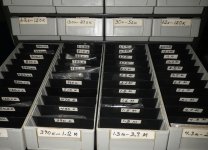
The smaller drawer assortments are like these
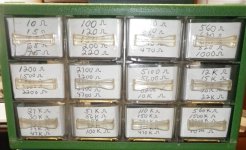
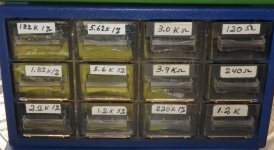
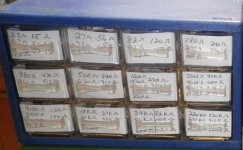
Most of these are full of small bags of assorted resistors, one is all metal film type, the others are just varying wattage resistors.
There are dozens of these kits like this.
What's hard to figure is why he had so many duplicates. They were stored on shelves in no real order, some double stacked, hidden behind other items or even boxes. It too me most of the day to just locate and get all of a kind in one area.
I'm not sure how I'm going to sort these out but if I leave them all in separate boxes like they are now it'll drive me crazy everytime I have to go digging for a particular part.
There's far more then I first realized. Some of the large cardboard boxes contain complete assortments of 2500 of each value in 1/8 and 1/4w values. I found some boxes of smaller transistors too, in 5,000 quantity bags, 2N5457, 2N5459, 2N5087,2N39804, 2N3906 and 2N5210. There's also whole drawers of the same p/n's in the Akron cabinets.
There's no shortage of small drawer organizers, there's 30 60 drawer containers, and even more of the smaller 12 drawer assortments, plus a few case lots of them still in the box. Most are from Mouser and Digikey. Most of the transistors are Motorola branded.
When I first loaded up all the drawer cabinets, I was careful to put them in the truck first in a way they wouldn't dump, I dind't pay much attention to the cardboard boxes, or wooden drawer cabinets. There's a 20 drawer assortment of Mosfets and another with all TO-3 transistors
The Akron cabinets have dividers, lots of them, plus a few hundred extras in boxes. There's 39 of them in all, with one stack of 5 being all resistors, one all capacitors, one is all transistors, and one stack being all op-amps and memory chips. Each stack is 80 drawers.
There's also boxes of clear plastic flip lid style assortments, some in case quantities. In the books and files I got with it all looks like he bought most of it himself. The receipts range from 1971 to 2009.
There's also a couple of cabinets full of used variable resistors, switches, and knobs.
I'm starting to realize that this is going to take a while to organize.
This is what the layout inside the larger cabinet is for the resistors, each value is in small bags and there's lots of those bags.

The smaller drawer assortments are like these



Most of these are full of small bags of assorted resistors, one is all metal film type, the others are just varying wattage resistors.
There are dozens of these kits like this.
What's hard to figure is why he had so many duplicates. They were stored on shelves in no real order, some double stacked, hidden behind other items or even boxes. It too me most of the day to just locate and get all of a kind in one area.
I'm not sure how I'm going to sort these out but if I leave them all in separate boxes like they are now it'll drive me crazy everytime I have to go digging for a particular part.
Its sorting out the resistors that's going to be the real chore.
I'm leaning toward putting every smaller 'kit' into marked bags and storing them by value alone in one cabinet. right now all the smaller kits are taking up three shelves 12ft long, I figure that can be knocked down to two Akron drawer cabinets or less.
The small drawers don't work well for the quantities at hand. Over full drawers and dividers that fall out of place just make for a mess down the road.
What I'm not understanding is how the former owner of all this ever found anything. One example is one of the 6ft towers of Akron boxes, the top section is a mix of caps, diodes, large resistors, transistors, and one drawer with all of the above divided in five sections. The next 16 drawers below it is a mix of op amps, mosfets, huge power supply caps, screws, one drawer full of 2N5551 transistors, and one drawer full of 12v toggle switches. The next 16 drawers is a mix again, with one row of aluminum can, radial caps, military grade stuff, plus a drawer full of variable capacitors, some knobs, and drawer full of 81Ω 5w metal film resistors, about 8 lbs of them.
The next 16 drawers is mostly caps, sorted by value not type, plus a few drawers with large gold power resistors, some TO3 transistors, and two drawers of purple and red LED's.
The next group of drawers is all 120v panel bulbs, indicators, and lit buttons, with one drawer full of 6L6 tubes. The next group is a mix of more radial caps, 5 drawers of tube sockets, a drawer of old ceramic turntable cartridges and a few newer ADC cartridges, but nothing high end, and one drawer full of TT styli in Realistic packages, about 80 or so of them.
There are a dozen flip top containers that came out of his garage full of Radio Shack parts, as if someone went into the store back in 1980 or so and filled two shopping carts full of packages off the wall. This lot includes speakers, electronics parts, tweeters, wire, and tapes. All I've done so far is to mark those boxes but those alone will require several days of sorting.
I'm not looking at this as something to sell, I figure if I can organize this all and consolidate it down to a manageable size, it may save me a time chasing parts for projects here. With no local parts source, (this guy was sort of it for those who knew him), I'm hoping the effort will save me hundreds in shipping alone.
A good example is a preamp I'm working on, I had to order a handful of parts and am still waiting, with the parts having to come from Japan, while those are already ordered and likely on their way, I'm betting I'll find them in this lot.
The part that's boggled my mind is the shear quantity of some items, and what use he would have had for that many being that he didn't actively sell parts or do repairs, he was just a tinkerer who had a reputation for working on Ham radio gear and old CB radios, bu he did mess with some old radios, stereos, and even TV's back in the day. The story I had heard was that back in the 70's when he came home from a 20 year stint in the air force, he returned to work for a guy he had worked for before his years in the service, when that guy decided to hang it up and retire, he bought him out and brought the contents of that shop for his own use.
He then went to every swap meet and show that popped up and bought more and more. I had been to his house quite a few times but never realized the extent of what he had. Usually I'd go there looking for a part and he'd dig around either in his cabinets over his bench or he'd go into this huge walk-in closet he had full of these drawer cabinets and come back out with what ever I needed.
I actually built him the racks that the Akron cabinets sit on, and the roller bases for free because he never once would take any money for the parts I got from him. I went with him once to a 'hamfest' down in MD, he drove an old Jeep Wagoneer, and by the time we left, that Jeep barely had enough room for two guys to sit when he got done buying. He'd buy anything US or Japanese made.
I remember once he bought these rolls of 220Ω 5w resistors and the rolls wouldn't fit into the back of the Jeep, so he had to bundle them all up in a blue tarp and duct tape them to the roof rack to get the 60" rolls of resistors home. They were separated by a crimped section in between each one and rolled onto a thin spool with paper separating every layer. That was 15 years ago when I first move here. I've not found any of those so far though, which makes me wonder what he did with them, let alone what they were intended for.
They were branded SEI on the boxes the spools came in and all 20 some spools were the same value, same p/n.
As I dig through all this, I'm finding dozens of duplicate assortments, mostly of resistors and transistors, the most numerous assortments are 24 drawer boxes from Mouser with each drawer having four or five 1/4w resistor values in it. Some are still shrink wrapped closed. It looks like there's 25 of each value in each kit, and there's a box of 12 kits, plug 22 more that have been opened and some pieces used.
Then there's these flat boxes, full or transistors, multiples of the exact same kits, one cardboard box has 120 kits of all the same assortment.
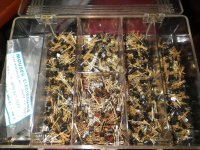
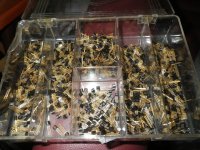
These are all full of the same p/n transistors.
There's a full 'case' of these kits from Motorola.
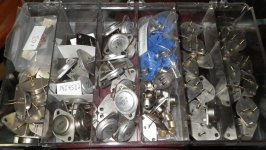
There's a few dozen of these too, all exactly the same.
I've gone through and tagged a few of them with P/Ns for easier ID.
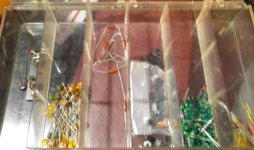
Then there's boxes like this, with barely anything in them, but all the same.
There's not enough here to be kit of any sort, just an odd group of parts, mostly small caps and a few regulators and resistors.
Someone told me too that back in the day this guy built high power linear amps for CB radio broadcast. While some components could be from those builds, most just isn't anything I'd expect in a 1000w linear, and there's no high wattage or high amp components. Its more or less more suited for audio or small circuit applications. Some of the larger transistors maybe, but not the boxes of 2N3934 and 2N5087, 2N3904, and 2N3906, 2N5551 transistors and such which there are so many of. There's literally a hundred or more lbs of each p/n, all in older Motorola assortments with invoices from 1979. (The invoices are from Motorola to a couple of tech schools and one university). Some of the boxes of aluminum body capacitors are miltary, dated from the 80's and 90's.
I did have someone here that wanted to 'make an offer on it all' but after they offered me $200 for everything with a long story about how much labor would be involved to resell it, I told him its not for sale, not interested. It will save me more than $200 the first time I used any of it if only in not having to special order something or pay eBay prices for some part that's no longer available.
There's one box, about 24x12x12, full of 250v rated toggle switches, all new. there's another box full of rocker switches, and in the box is the cutting die to make the rectangular hole in the chassis for that switch. All are Gardner-Bender branded, then there's a few boxes of Cole-Hersee switches as well, also in large boxes of 144 pieces or more.
I think what I'm dealing with is more the life long results of a hoarder than a repair shop, or someone who was trying to single handedly preserve as many parts as he could.
I'm also finding boxes of 'kits' from various brands, including Heathkit and a few similar. Including a couple of amp kits probably from the 70's.
The list of new tubes is also growing, with a full box of 6CA4 tubes, made in England, and several boxes of misc RCA branded tubes, but that stuff is much older than the rest. I'm guessing its items he bought as part of a lot because I don't recall him messing much with tubes, at least not during the time I knew him. Tubes were likely on their way out by the time he started hoarding this stuff.
The one thing that I simply can't figure out is why he has the same items in both small drawer boxes, flat boxes, and the large cabinets, as well as in zip lock bags. There seems to be no attempt to consolidate same parts in one drawer of cabinet.
Many of the Mouser resistor kits are open with only a few pieces missing, rather than depleting one, then opening the next as I would have expected or likely done myself. They were also all in the same area, its not like they were in different buildings, they were all in one room for the most part with only the large case lots being stored in shelves in the garage. (30x36ft two car garage that was shelved out like a parts room with a tear down bench and four desoldering stations set up on that bench.
There's also alot of salvaged parts, like transformers, tube sockets, larger resistors, inductors, etc. He was also tearing apart a bunch of 70's slot machines.
Those parts I did sell off, both for the cash and for the space. The buyer was after the cosmetic pieces more than the internal parts. He wanted the glass lenses, chrome bits and cabinets. There were 27 in all, and all were pre-1980.
I suppose I could go on for pages here describing all the stuff so far.
I'm just glad it was me she called and not some clean out guy who'd have either trashed it all or hauled it to the fleamarket or fleabay.
Of course, what's yet to be seen, is how usefull the parts at hand will be. I'm kind of assuming many may be of little value to me audio wise when it comes to old receivers and amps, but a lot of it will no doubt will be.
Once its all sorted and organized it'll be far less daunting to deal with. Getting all the tiny boxes of drawers consolidated into one place is the job one right now. That alone will cut down the amount of space it all takes up and increase the likely hood of finding something when I need it.
I'm leaning toward putting every smaller 'kit' into marked bags and storing them by value alone in one cabinet. right now all the smaller kits are taking up three shelves 12ft long, I figure that can be knocked down to two Akron drawer cabinets or less.
The small drawers don't work well for the quantities at hand. Over full drawers and dividers that fall out of place just make for a mess down the road.
What I'm not understanding is how the former owner of all this ever found anything. One example is one of the 6ft towers of Akron boxes, the top section is a mix of caps, diodes, large resistors, transistors, and one drawer with all of the above divided in five sections. The next 16 drawers below it is a mix of op amps, mosfets, huge power supply caps, screws, one drawer full of 2N5551 transistors, and one drawer full of 12v toggle switches. The next 16 drawers is a mix again, with one row of aluminum can, radial caps, military grade stuff, plus a drawer full of variable capacitors, some knobs, and drawer full of 81Ω 5w metal film resistors, about 8 lbs of them.
The next 16 drawers is mostly caps, sorted by value not type, plus a few drawers with large gold power resistors, some TO3 transistors, and two drawers of purple and red LED's.
The next group of drawers is all 120v panel bulbs, indicators, and lit buttons, with one drawer full of 6L6 tubes. The next group is a mix of more radial caps, 5 drawers of tube sockets, a drawer of old ceramic turntable cartridges and a few newer ADC cartridges, but nothing high end, and one drawer full of TT styli in Realistic packages, about 80 or so of them.
There are a dozen flip top containers that came out of his garage full of Radio Shack parts, as if someone went into the store back in 1980 or so and filled two shopping carts full of packages off the wall. This lot includes speakers, electronics parts, tweeters, wire, and tapes. All I've done so far is to mark those boxes but those alone will require several days of sorting.
I'm not looking at this as something to sell, I figure if I can organize this all and consolidate it down to a manageable size, it may save me a time chasing parts for projects here. With no local parts source, (this guy was sort of it for those who knew him), I'm hoping the effort will save me hundreds in shipping alone.
A good example is a preamp I'm working on, I had to order a handful of parts and am still waiting, with the parts having to come from Japan, while those are already ordered and likely on their way, I'm betting I'll find them in this lot.
The part that's boggled my mind is the shear quantity of some items, and what use he would have had for that many being that he didn't actively sell parts or do repairs, he was just a tinkerer who had a reputation for working on Ham radio gear and old CB radios, bu he did mess with some old radios, stereos, and even TV's back in the day. The story I had heard was that back in the 70's when he came home from a 20 year stint in the air force, he returned to work for a guy he had worked for before his years in the service, when that guy decided to hang it up and retire, he bought him out and brought the contents of that shop for his own use.
He then went to every swap meet and show that popped up and bought more and more. I had been to his house quite a few times but never realized the extent of what he had. Usually I'd go there looking for a part and he'd dig around either in his cabinets over his bench or he'd go into this huge walk-in closet he had full of these drawer cabinets and come back out with what ever I needed.
I actually built him the racks that the Akron cabinets sit on, and the roller bases for free because he never once would take any money for the parts I got from him. I went with him once to a 'hamfest' down in MD, he drove an old Jeep Wagoneer, and by the time we left, that Jeep barely had enough room for two guys to sit when he got done buying. He'd buy anything US or Japanese made.
I remember once he bought these rolls of 220Ω 5w resistors and the rolls wouldn't fit into the back of the Jeep, so he had to bundle them all up in a blue tarp and duct tape them to the roof rack to get the 60" rolls of resistors home. They were separated by a crimped section in between each one and rolled onto a thin spool with paper separating every layer. That was 15 years ago when I first move here. I've not found any of those so far though, which makes me wonder what he did with them, let alone what they were intended for.
They were branded SEI on the boxes the spools came in and all 20 some spools were the same value, same p/n.
As I dig through all this, I'm finding dozens of duplicate assortments, mostly of resistors and transistors, the most numerous assortments are 24 drawer boxes from Mouser with each drawer having four or five 1/4w resistor values in it. Some are still shrink wrapped closed. It looks like there's 25 of each value in each kit, and there's a box of 12 kits, plug 22 more that have been opened and some pieces used.
Then there's these flat boxes, full or transistors, multiples of the exact same kits, one cardboard box has 120 kits of all the same assortment.


These are all full of the same p/n transistors.
There's a full 'case' of these kits from Motorola.

There's a few dozen of these too, all exactly the same.
I've gone through and tagged a few of them with P/Ns for easier ID.

Then there's boxes like this, with barely anything in them, but all the same.
There's not enough here to be kit of any sort, just an odd group of parts, mostly small caps and a few regulators and resistors.
Someone told me too that back in the day this guy built high power linear amps for CB radio broadcast. While some components could be from those builds, most just isn't anything I'd expect in a 1000w linear, and there's no high wattage or high amp components. Its more or less more suited for audio or small circuit applications. Some of the larger transistors maybe, but not the boxes of 2N3934 and 2N5087, 2N3904, and 2N3906, 2N5551 transistors and such which there are so many of. There's literally a hundred or more lbs of each p/n, all in older Motorola assortments with invoices from 1979. (The invoices are from Motorola to a couple of tech schools and one university). Some of the boxes of aluminum body capacitors are miltary, dated from the 80's and 90's.
I did have someone here that wanted to 'make an offer on it all' but after they offered me $200 for everything with a long story about how much labor would be involved to resell it, I told him its not for sale, not interested. It will save me more than $200 the first time I used any of it if only in not having to special order something or pay eBay prices for some part that's no longer available.
There's one box, about 24x12x12, full of 250v rated toggle switches, all new. there's another box full of rocker switches, and in the box is the cutting die to make the rectangular hole in the chassis for that switch. All are Gardner-Bender branded, then there's a few boxes of Cole-Hersee switches as well, also in large boxes of 144 pieces or more.
I think what I'm dealing with is more the life long results of a hoarder than a repair shop, or someone who was trying to single handedly preserve as many parts as he could.
I'm also finding boxes of 'kits' from various brands, including Heathkit and a few similar. Including a couple of amp kits probably from the 70's.
The list of new tubes is also growing, with a full box of 6CA4 tubes, made in England, and several boxes of misc RCA branded tubes, but that stuff is much older than the rest. I'm guessing its items he bought as part of a lot because I don't recall him messing much with tubes, at least not during the time I knew him. Tubes were likely on their way out by the time he started hoarding this stuff.
The one thing that I simply can't figure out is why he has the same items in both small drawer boxes, flat boxes, and the large cabinets, as well as in zip lock bags. There seems to be no attempt to consolidate same parts in one drawer of cabinet.
Many of the Mouser resistor kits are open with only a few pieces missing, rather than depleting one, then opening the next as I would have expected or likely done myself. They were also all in the same area, its not like they were in different buildings, they were all in one room for the most part with only the large case lots being stored in shelves in the garage. (30x36ft two car garage that was shelved out like a parts room with a tear down bench and four desoldering stations set up on that bench.
There's also alot of salvaged parts, like transformers, tube sockets, larger resistors, inductors, etc. He was also tearing apart a bunch of 70's slot machines.
Those parts I did sell off, both for the cash and for the space. The buyer was after the cosmetic pieces more than the internal parts. He wanted the glass lenses, chrome bits and cabinets. There were 27 in all, and all were pre-1980.
I suppose I could go on for pages here describing all the stuff so far.
I'm just glad it was me she called and not some clean out guy who'd have either trashed it all or hauled it to the fleamarket or fleabay.
Of course, what's yet to be seen, is how usefull the parts at hand will be. I'm kind of assuming many may be of little value to me audio wise when it comes to old receivers and amps, but a lot of it will no doubt will be.
Once its all sorted and organized it'll be far less daunting to deal with. Getting all the tiny boxes of drawers consolidated into one place is the job one right now. That alone will cut down the amount of space it all takes up and increase the likely hood of finding something when I need it.
I actually have some peg board but I don't have anywhere near the wall space it would take to hang all this stuff.
I spent this morning with his daughter over at a local self storage facility. It turns out he also had a 10x20 locker packed full as well.
It took from 9am to almost 4pm to load it all in my truck and trailer. Its a mix of boxes, trunks, bags, etc full of parts. The rolls I mentioned before were there too.
I found two black travel trunks full of these Digikey assortments, all 5 packs of various values, but there's hundreds of every value dumped in the two steel trunks, each trunk is about 24x36x18 deep. They're packed full. They go up to 20Ω.
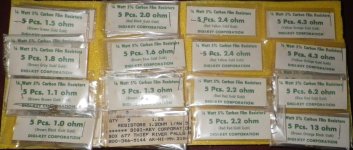
There's other resistors on rolls, all marked metal film 1% in various different values.
The majority of the resistors though are carbon film.
I think I sort of figured out how he's got these sorted, each 60 drawer box is a range of values, some are .001 through .999, then 1 through 999, then some at 1k through 999k, and so on. Then there's metal film, carbon film, and carbon comp assortments, as well as ceramic and wire wound assortments. The cardboard boxes are mostly refills in huge quantities. Most assortments are in 500pcs of each value and up.
Today I loaded up some older metal cabinets, they look more like old library card file cabinets too, those are packed solid and are taking up a good bit of my 18ft car trailer. The good part is today gave me some carts to use to move this stuff around on. He had 6ft tall rolling av racks in storage.
Two of the boxes I found today has 48 boxes of 2500 TIP31C, and two boxes of the same with TIP32C transistors. He must have been buying this stuff by the pound. Nearly all transistors are in Motorola boxes shipped from Motorola in Phoenix to an address in MD.
The bill of laden is dated June 1989. There's also two other boxes, each missing one smaller box each of the same part numbers.
The lot from the storage locker sort of rounded out the whole mess quantity wise, up until now it was looking like there were more resistors than anything else, now its looking like there's just as many transistors and capacitors. In the transistors, the older stuff is RCA, then Motorola, then ON Semiconductor for the later items.
None of which though makes much sense as to what he was doing with it all. It looks like he was more hoarding it than using it. I've found almost no signs of him actually using any of it. Very little of the equipment was hooked up or looked like it was actually being used, it was just on the shelf there, with all the cables and cords packed away in boxes.
Then there's the drawers that are a complete mix, partitioned drawers with a mix of various transistors, caps, diodes, and resistors with no rhyme or reason why they were all tossed into one drawer. One larger drawer was a mix of 32 different diodes, roughly 50 of each, 100 transistors, (TIP120), 20 metal film 220 ohm resistors, 40 14a fuses, 300 serrated washers and grounding lugs, and a handful of germanium diodes, two dozen 2N3568, and 2N3231 transistors, and EMP3636A transistors. All dumped into one large drawer in one of the Akron cabinets. At first I thought maybe it was just a random junk drawer but there's 8 drawers with nearly the exact same contents in them. Its almost as if he bought kits for something and just dumped each kit into its own drawer but I don't see many situations where that mix of parts would be used together, especially with that many diodes. I would think if he was just dumping out drawers to make room, he'd have put all the resistors in one drawer, all the diodes in one drawer, etc. Yet other drawers are meticulously sorted and organized by type and part number.
I'm soon realizing that what I thought would be a cool lot of parts to have on hand is quickly looking like an industrial sized inventory. He must have bought some things by the pound not by the package.
I just can't grasp what he was doing there, usually when I come across some old guys work shop or tools you get a feel for what they were doing but I don't see that here.
I tried to go to a few of the online suppliers to get some idea of the value of this stuff, but most of it is simply not offered in these numbers. I see resistor assortments that come in box lots of 217 values, 10 of each and similar, but no assortment or lots of 2,500 or more of any one number. I didn't bother to call, as I'd just be wasting someone's time but its hard to imagine what he could have spent for all this, even if it did buy it as surplus somewhere. There's too much of it to be odd lots here and there, he had to have bought whole store inventories or factory inventories at some point. This isn't just a hobbyist collection of misc parts.
I had always thought he tinkered with old radios and TV's which he did on occasion but these parts aren't radio or TV oriented. In fact, there's very little that tells me he was buying vintage parts for that sort of repair, and even so, 2500 or any one p/n is beyond a 'lifetime' supply.
When I first looked at all this, my thought was that I"d consolidate it all into the larger cabinets and not have the dozens of smaller boxes taking up shelf space but nearly ever last drawer in every last box is stuffed full, it will take dozens more of the Akron 4x12" drawer cabinets to consolidate it all. Even then, do so will take weeks at the current rate because there's so much crossover between drawers and bins either out of carelessness or drawer over-spill.
There's also a good number of items I've yet to ID, either because the p/n is old or obsolete or something just not found in the audio equipment I'm used to working on. One in particular is what looks like a small can type transistor but with 16 legs out of a 10mm diameter base marked only with A-B 15. They're likely some sort of early op-amp or combination transistor but there's not much to go on. There's also thousands of various op-amps or IC chips, some I recognize, others I can't even find a listing for. Most are in huge box lots or full drawers of one or two p/n's each. Some are early CMOS chips, a few are numeric display chips, and such. A buddy said he thinks some of the chips may have slot machine or pinball game applications. He did have slot machines there, but most were parted out or torn apart.
Some parts may be CB related as well since a good many books I found were on custom linear amps and CB repair.
I'll likely never know the half of what he was doing I suppose, but no doubt I'll likely never have to buy another resistor, diode, or transistor as long as I live. There's also buckets of bridge rectifiers, about 25 various p/n's, many of which are common in a lot of equipment. The same with the LED's bulbs, and large diodes.
I spent this morning with his daughter over at a local self storage facility. It turns out he also had a 10x20 locker packed full as well.
It took from 9am to almost 4pm to load it all in my truck and trailer. Its a mix of boxes, trunks, bags, etc full of parts. The rolls I mentioned before were there too.
I found two black travel trunks full of these Digikey assortments, all 5 packs of various values, but there's hundreds of every value dumped in the two steel trunks, each trunk is about 24x36x18 deep. They're packed full. They go up to 20Ω.

There's other resistors on rolls, all marked metal film 1% in various different values.
The majority of the resistors though are carbon film.
I think I sort of figured out how he's got these sorted, each 60 drawer box is a range of values, some are .001 through .999, then 1 through 999, then some at 1k through 999k, and so on. Then there's metal film, carbon film, and carbon comp assortments, as well as ceramic and wire wound assortments. The cardboard boxes are mostly refills in huge quantities. Most assortments are in 500pcs of each value and up.
Today I loaded up some older metal cabinets, they look more like old library card file cabinets too, those are packed solid and are taking up a good bit of my 18ft car trailer. The good part is today gave me some carts to use to move this stuff around on. He had 6ft tall rolling av racks in storage.
Two of the boxes I found today has 48 boxes of 2500 TIP31C, and two boxes of the same with TIP32C transistors. He must have been buying this stuff by the pound. Nearly all transistors are in Motorola boxes shipped from Motorola in Phoenix to an address in MD.
The bill of laden is dated June 1989. There's also two other boxes, each missing one smaller box each of the same part numbers.
The lot from the storage locker sort of rounded out the whole mess quantity wise, up until now it was looking like there were more resistors than anything else, now its looking like there's just as many transistors and capacitors. In the transistors, the older stuff is RCA, then Motorola, then ON Semiconductor for the later items.
None of which though makes much sense as to what he was doing with it all. It looks like he was more hoarding it than using it. I've found almost no signs of him actually using any of it. Very little of the equipment was hooked up or looked like it was actually being used, it was just on the shelf there, with all the cables and cords packed away in boxes.
Then there's the drawers that are a complete mix, partitioned drawers with a mix of various transistors, caps, diodes, and resistors with no rhyme or reason why they were all tossed into one drawer. One larger drawer was a mix of 32 different diodes, roughly 50 of each, 100 transistors, (TIP120), 20 metal film 220 ohm resistors, 40 14a fuses, 300 serrated washers and grounding lugs, and a handful of germanium diodes, two dozen 2N3568, and 2N3231 transistors, and EMP3636A transistors. All dumped into one large drawer in one of the Akron cabinets. At first I thought maybe it was just a random junk drawer but there's 8 drawers with nearly the exact same contents in them. Its almost as if he bought kits for something and just dumped each kit into its own drawer but I don't see many situations where that mix of parts would be used together, especially with that many diodes. I would think if he was just dumping out drawers to make room, he'd have put all the resistors in one drawer, all the diodes in one drawer, etc. Yet other drawers are meticulously sorted and organized by type and part number.
I'm soon realizing that what I thought would be a cool lot of parts to have on hand is quickly looking like an industrial sized inventory. He must have bought some things by the pound not by the package.
I just can't grasp what he was doing there, usually when I come across some old guys work shop or tools you get a feel for what they were doing but I don't see that here.
I tried to go to a few of the online suppliers to get some idea of the value of this stuff, but most of it is simply not offered in these numbers. I see resistor assortments that come in box lots of 217 values, 10 of each and similar, but no assortment or lots of 2,500 or more of any one number. I didn't bother to call, as I'd just be wasting someone's time but its hard to imagine what he could have spent for all this, even if it did buy it as surplus somewhere. There's too much of it to be odd lots here and there, he had to have bought whole store inventories or factory inventories at some point. This isn't just a hobbyist collection of misc parts.
I had always thought he tinkered with old radios and TV's which he did on occasion but these parts aren't radio or TV oriented. In fact, there's very little that tells me he was buying vintage parts for that sort of repair, and even so, 2500 or any one p/n is beyond a 'lifetime' supply.
When I first looked at all this, my thought was that I"d consolidate it all into the larger cabinets and not have the dozens of smaller boxes taking up shelf space but nearly ever last drawer in every last box is stuffed full, it will take dozens more of the Akron 4x12" drawer cabinets to consolidate it all. Even then, do so will take weeks at the current rate because there's so much crossover between drawers and bins either out of carelessness or drawer over-spill.
There's also a good number of items I've yet to ID, either because the p/n is old or obsolete or something just not found in the audio equipment I'm used to working on. One in particular is what looks like a small can type transistor but with 16 legs out of a 10mm diameter base marked only with A-B 15. They're likely some sort of early op-amp or combination transistor but there's not much to go on. There's also thousands of various op-amps or IC chips, some I recognize, others I can't even find a listing for. Most are in huge box lots or full drawers of one or two p/n's each. Some are early CMOS chips, a few are numeric display chips, and such. A buddy said he thinks some of the chips may have slot machine or pinball game applications. He did have slot machines there, but most were parted out or torn apart.
Some parts may be CB related as well since a good many books I found were on custom linear amps and CB repair.
I'll likely never know the half of what he was doing I suppose, but no doubt I'll likely never have to buy another resistor, diode, or transistor as long as I live. There's also buckets of bridge rectifiers, about 25 various p/n's, many of which are common in a lot of equipment. The same with the LED's bulbs, and large diodes.
As I sort out all this stuff I'm quickly realizing a few more things here, first, the original description of the guy being a former shop owner was probably wrong. He was definitely a hoarder with unknown intentions.
I'm also realizing that there's no way any one cabinet will hold a full assortment of any one type of components.
Even if I place all the resistors into one cabinet, putting each value in a marked bag, then in a drawer marked by every 10Ω or so, I'd need a thousand drawers, or close to it.
What I'm finding is that from 1 to 999Ω the assortment misses almost no values. As I dug out all the little assortments, what I'm finding is that one 'set' will have values such as 1, 3, 5, 10, 12, ...120, 130, etc. then another will be 2, 2.5, 3.1, 3.2, 3.3, 5, 5.2, etc. If broken up and made into one inventoried assortment of each wattage value, its nearly 100% coverage through the range up to 1k, then over 1k to 100k its in jumps of 10, then over 1m, its in jumps of 100.
The majority or most complete assortment is in 1/4w, but there's 1/8w up to 1k, 1/2w up to 100k, and 2w, 3w and 5w ranges in more basic assortments. Then there's wire wound resistor assortments, ceramic assortments, and carbon comp assortments too.
I've been separating the carbon comp from the carbon film and metal film resistors and so far there's about 50lbs of carbon comp resistors in all wattage ratings, and nearly as many metal film resistors as well.
So far I've made a list of 4012 different transistor part numbers in varying quantities.
The list of op-amps and similar chips is over 850 different part numbers not counting suffix variations on many numbers.
I still like the idea of putting each size in a baggie with a tag, and laying those bags into a drawer but even doing that with say 100 pc quantities per drawer, it'll take no fewer than 75 large drawers and even then the drawers will likely be over filled and a hassle to dig through. If I separate the larger quantity boxes keeping them as 'refill' stock i then need to inventory those as well and find a way to easily get at the size needed when the time comes. Just dumping it all in a box would be worse than what I'm dealing with now.
What may throw a wrench into all I've sorted out so far is that his daughter called me to say she found more stuff that he had stashed in another garage belonging to one of her cousins and I now have to go get that stuff as well. She said "Its only a few boxes and cabinets", then she said I better bring my trailer just in case.
One week into this and what started as a pretty cool 'free' load of spare parts has become a basement, garage, two trailers and a van load of stuff, plus what's now piled on my back porch in tubs from the other day. I borrowed a buddies trailer for today and I'm heading over there around 1pm.
I'm also realizing that there's no way any one cabinet will hold a full assortment of any one type of components.
Even if I place all the resistors into one cabinet, putting each value in a marked bag, then in a drawer marked by every 10Ω or so, I'd need a thousand drawers, or close to it.
What I'm finding is that from 1 to 999Ω the assortment misses almost no values. As I dug out all the little assortments, what I'm finding is that one 'set' will have values such as 1, 3, 5, 10, 12, ...120, 130, etc. then another will be 2, 2.5, 3.1, 3.2, 3.3, 5, 5.2, etc. If broken up and made into one inventoried assortment of each wattage value, its nearly 100% coverage through the range up to 1k, then over 1k to 100k its in jumps of 10, then over 1m, its in jumps of 100.
The majority or most complete assortment is in 1/4w, but there's 1/8w up to 1k, 1/2w up to 100k, and 2w, 3w and 5w ranges in more basic assortments. Then there's wire wound resistor assortments, ceramic assortments, and carbon comp assortments too.
I've been separating the carbon comp from the carbon film and metal film resistors and so far there's about 50lbs of carbon comp resistors in all wattage ratings, and nearly as many metal film resistors as well.
So far I've made a list of 4012 different transistor part numbers in varying quantities.
The list of op-amps and similar chips is over 850 different part numbers not counting suffix variations on many numbers.
I still like the idea of putting each size in a baggie with a tag, and laying those bags into a drawer but even doing that with say 100 pc quantities per drawer, it'll take no fewer than 75 large drawers and even then the drawers will likely be over filled and a hassle to dig through. If I separate the larger quantity boxes keeping them as 'refill' stock i then need to inventory those as well and find a way to easily get at the size needed when the time comes. Just dumping it all in a box would be worse than what I'm dealing with now.
What may throw a wrench into all I've sorted out so far is that his daughter called me to say she found more stuff that he had stashed in another garage belonging to one of her cousins and I now have to go get that stuff as well. She said "Its only a few boxes and cabinets", then she said I better bring my trailer just in case.
One week into this and what started as a pretty cool 'free' load of spare parts has become a basement, garage, two trailers and a van load of stuff, plus what's now piled on my back porch in tubs from the other day. I borrowed a buddies trailer for today and I'm heading over there around 1pm.
I picked up nearly a full van load of tubs full of more parts.
I got back late and its all sitting in the driveway waiting for me to go unload it all.
Most of it is more of the same, but I saw one tub was full of blank circuit boards, another full of misc. circuit boards that look pretty old, a tub or more of tubes, one full tub of blue 1/4w metal foil resistors in boxes, a quick look tells me there's only a few values in there but there's 50 per box, and 10 boxes per box, and 48 boxes per case. The boxes are all white with blue and green logos, I don't remember what the brand was without going out there and digging them out.
There's at least two more full tubs of TO-3 transistors, and two tubs of the same clear boxes of small transistors, plus a couple of boxes of wood boxed, TO-220 transistors. Each wood box is about 12x12x4" with a hinged lid. Each wood box is lined with some sort of film/paper and is filled to the top with loose transistors. The boxes look more like something an old electric shaver would come in, or maybe cigars. They look older and are marked made in Canada branded on the wood inside the lid. The transistors are blue colored RCA branded TO-220 types in several p/n's There's likely 5k per box or more. There's also a full tub of aluminum axial Mallory capacitors all in military packaging. Those are dated 12-1973 and 4-1980. There's roughly 100 lbs total in that tub.
There are two full tubs of box lots of epoxy type capacitors in various values, each in 500 per box. I didn't go beyond just popping open the lid to make sure its parts and not personal items or something. There is one box with a few books full of receipts, parts guides, and some interchange type manuals from Motorola and National.
On top of the tubs, there's a few hundred misc books on electronics, circuit building, parts selections, etc. all the books are older, from the 60's and 70's, a few are from the 40's and 50's. Maybe 200 or so in all. (I was glad my van is a one ton model).
I'm not making much progress on sorting though all this so far, but with the additional loads, its just as well. It may change how I arrange it all.
At this point, the smallest lot will be diodes, followed by capacitors, then larger transistors, (going by how many p/n's there are in all).
Resistors by far outnumber everything else.
No matter what I do, I have to empty out some bins to re-arrange it all in some resemblance of order. That alone is going to be a huge task and take a ton of sorting out of the many drawers that have no order or sorting whatsoever.
I got back late and its all sitting in the driveway waiting for me to go unload it all.
Most of it is more of the same, but I saw one tub was full of blank circuit boards, another full of misc. circuit boards that look pretty old, a tub or more of tubes, one full tub of blue 1/4w metal foil resistors in boxes, a quick look tells me there's only a few values in there but there's 50 per box, and 10 boxes per box, and 48 boxes per case. The boxes are all white with blue and green logos, I don't remember what the brand was without going out there and digging them out.
There's at least two more full tubs of TO-3 transistors, and two tubs of the same clear boxes of small transistors, plus a couple of boxes of wood boxed, TO-220 transistors. Each wood box is about 12x12x4" with a hinged lid. Each wood box is lined with some sort of film/paper and is filled to the top with loose transistors. The boxes look more like something an old electric shaver would come in, or maybe cigars. They look older and are marked made in Canada branded on the wood inside the lid. The transistors are blue colored RCA branded TO-220 types in several p/n's There's likely 5k per box or more. There's also a full tub of aluminum axial Mallory capacitors all in military packaging. Those are dated 12-1973 and 4-1980. There's roughly 100 lbs total in that tub.
There are two full tubs of box lots of epoxy type capacitors in various values, each in 500 per box. I didn't go beyond just popping open the lid to make sure its parts and not personal items or something. There is one box with a few books full of receipts, parts guides, and some interchange type manuals from Motorola and National.
On top of the tubs, there's a few hundred misc books on electronics, circuit building, parts selections, etc. all the books are older, from the 60's and 70's, a few are from the 40's and 50's. Maybe 200 or so in all. (I was glad my van is a one ton model).
I'm not making much progress on sorting though all this so far, but with the additional loads, its just as well. It may change how I arrange it all.
At this point, the smallest lot will be diodes, followed by capacitors, then larger transistors, (going by how many p/n's there are in all).
Resistors by far outnumber everything else.
No matter what I do, I have to empty out some bins to re-arrange it all in some resemblance of order. That alone is going to be a huge task and take a ton of sorting out of the many drawers that have no order or sorting whatsoever.
As I see it you can become a hoarder or seller.
You only need to sort out a lifetime of useful parts for yourself and perhaps a few friends.
The rest can be sold in batches. No need to sort the batches. You can eBay it or even find someone to do it for you even as unsorted boxes. I would not hamfest it.
I personally would then give some money to the source of the stuff.
What you have is not just a lifetime accumulation of stuff, but as some was obtained from others lifetime collections, you have to allow a bit of time to dispose of it. Sorting to the component level and selling or giving it out completely sorted probably will take several lifetimes.
I suspect if you sort it all you will turn into a hoarder.
When I was cleaning out my stuff, even when offered for free, not all of it found welcoming homes.
You only need to sort out a lifetime of useful parts for yourself and perhaps a few friends.
The rest can be sold in batches. No need to sort the batches. You can eBay it or even find someone to do it for you even as unsorted boxes. I would not hamfest it.
I personally would then give some money to the source of the stuff.
What you have is not just a lifetime accumulation of stuff, but as some was obtained from others lifetime collections, you have to allow a bit of time to dispose of it. Sorting to the component level and selling or giving it out completely sorted probably will take several lifetimes.
I suspect if you sort it all you will turn into a hoarder.
When I was cleaning out my stuff, even when offered for free, not all of it found welcoming homes.
Last edited:
Yes, I know just how you feel; and some.
My boss purchased the contents of a closed TV service centre.
25000 service manuals. He decided initially to store them five miles away "so they do not get used he said". That lasted a few weeks until they were moved to our department. I took me a few weeks to catalogue tat lot into the Dewey Decimal system.
Spare parts. Initially, he had four school leavers catalogue the part parts. Trouble is descriptions like "black plastic thing with legs" does not work well when trying to find an integrated circuit. Worse still, all of the TV replacement panels seemed to have the same part number, the tuner module parts number.
After many weeks, of my work, nearly 400000 parts were catalogued and stored away.
Kevin
My boss purchased the contents of a closed TV service centre.
25000 service manuals. He decided initially to store them five miles away "so they do not get used he said". That lasted a few weeks until they were moved to our department. I took me a few weeks to catalogue tat lot into the Dewey Decimal system.
Spare parts. Initially, he had four school leavers catalogue the part parts. Trouble is descriptions like "black plastic thing with legs" does not work well when trying to find an integrated circuit. Worse still, all of the TV replacement panels seemed to have the same part number, the tuner module parts number.
After many weeks, of my work, nearly 400000 parts were catalogued and stored away.
Kevin
I've been working on finding and sorting out all the 1/4w resistors. So far I've got twenty two of those small drawer cabinets here, each with a random assortment of 1/4w resistors, some are identical sets, some are odd value, some are even values, some are mixed up.
I see three brands or colors of common 1/4w 5% carbon film resistors, most are in drawers either loose, or rolled up in Mouser bags.
Then there's 11 boxes of metal film resistors completely unsorted in random order.
The guy had no system or pattern to how this stuff was stored. About half the cabinets are set up as one value per drawer, some are two and three values in each drawer, some are dumped in loose, with three or four values mixed together. Then some drawers are arranged lowest value to highest value, and some are high to low, and some are arranged vertically others left to right or vice versa.
The worst one's are those that have many values just loose in a drawer.
I can't figure out if he kept buying parts because he couldn't find them, or if he got some of these from someone else.
Either way, its of no use to me if I can't find something when I need it. I have to have it sorted and all in one place. I'm not digging through 20+ cabinets and 200 drawers to find something when I need it. Its only a deal if it saves me money in the end.
I am seeing a ton of things I use all the time, and just as many that I've ordered and paid way too much shipping on.
This will no doubt mean far fewer orders for parts.
For right now, I lined up about 30 empty Akron drawers on a table and marked each one with a value, working on the lowest values and going up. I'm going through each of the smaller cabinets one drawer at at time and putting all like parts in the larger drawers to be bagged and tagged later. So far I'm about 1/4 of the way through and have emptied about 5 smaller cabinets that were all lower value kits. One 60 drawer cabinet had only 10 or so resistors in each drawer from 1 to 1m. That's a lot of space saved on the shelf just with one cabinet,
I'll probably repurose it to hold op-amps or less used items so it can be put on a top shelf out of the way. There are over 50 of that same size cabinet, and each one takes up about 15x20x8" of shelf space.
A few are barely filled, others are packed so tight you can't open the drawers.
There's also a few dozen early Craftsman brand 27 drawer cabinets that are likely from the 60's which have slightly larger drawers but the drawers are made of thicker plastic and have dividers that don't let things slide underneath.
I've not even unloaded all of them yet.
I'm sure a lot of this stuff is going to be trash. Finding all of the excess homes may take years. I really don't know how much demand there is for it these days, Even the last few hamfests I've been to were pretty lame, with pretty poor turnouts.
I've been to a trade shows and swap meets in various other hobbies and most have all but died out in the past years, or changed and moved away from the things us older guys like.
I've watched a few items on CL for a while now and while they're priced right, they don't sell
There's been a guy with two huge boxes of resistors listed, they look like Radio Shack parts packages, and the ad was up for over two years. If he was closer, I'd have grabbed it all myself. He had about 50 lbs of Resistors in boxes that he wanted $50 per box. The face value on 5 packages 20 years ago was more than he wanted but he got no takers. He also had an add on FB.
I've bought quite a few things recently that shouldn't have been there for so long, but the sellers had no takers or no emails.
I figured out why a few of the tubs were so heavy the other day.
I found 19 of these stainless steel assortments which were in the bottom of nearly every tub.
Plus two dozen brass assortments, and a full tub of chassis spacers and standoffs, mostly white plastic or nylon.
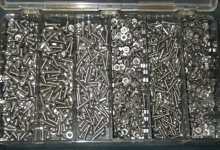
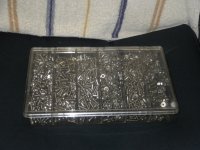
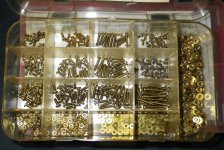
This is one of the Akron drawer towers that I'm going to try to see up as the main assortment.
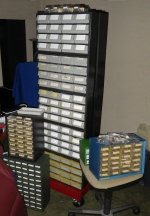
These stand roughly 6ft tall, each one has a platform and four swivel wheels with brakes. They're glued together with double sided tape and banded around the whole thing to hold them to the cart. There are 6 of these total, but one is missing a lot of drawers.
What I like about these is that they don't take up any shelf space and they can be rolled out of the way when not in use.
If I can get the whole lot down to what fits in these cabinets, it'll be far more user friendly that having to dig through drawer cabinets double and triple stacked on the shelf somewhere.
A few of these have clear plastic drawers, those are fragile and likely will need to be replaced if I can find some to fit. these cabinets are likely 50 years old. I found one of the drawers lined with a piece of newspaper from 1971.
The gray drawers with the large rectangular tags work the best. I could use about 50 or so replacement drawers but the few places I saw that sell them want way too much for them, and they're not the exact same drawer. These drawers are a gray poly not rigid acrylic.
A few of the small drawer boxes have broken drawers but I can part one cabinet out and fix the rest.
There's also a hundred or so of the stackable bins but those don't keep dust out. He had them lining the back of his work bench full of small parts, rolls of solder, soldering iron tips, etc.
He had cases of Weller soldering iron tips in cabinet above the bench. The type that scxew in like a light bulb, plus a half dozen brand new soldering irons. No temp controled solder stations though.
I see three brands or colors of common 1/4w 5% carbon film resistors, most are in drawers either loose, or rolled up in Mouser bags.
Then there's 11 boxes of metal film resistors completely unsorted in random order.
The guy had no system or pattern to how this stuff was stored. About half the cabinets are set up as one value per drawer, some are two and three values in each drawer, some are dumped in loose, with three or four values mixed together. Then some drawers are arranged lowest value to highest value, and some are high to low, and some are arranged vertically others left to right or vice versa.
The worst one's are those that have many values just loose in a drawer.
I can't figure out if he kept buying parts because he couldn't find them, or if he got some of these from someone else.
Either way, its of no use to me if I can't find something when I need it. I have to have it sorted and all in one place. I'm not digging through 20+ cabinets and 200 drawers to find something when I need it. Its only a deal if it saves me money in the end.
I am seeing a ton of things I use all the time, and just as many that I've ordered and paid way too much shipping on.
This will no doubt mean far fewer orders for parts.
For right now, I lined up about 30 empty Akron drawers on a table and marked each one with a value, working on the lowest values and going up. I'm going through each of the smaller cabinets one drawer at at time and putting all like parts in the larger drawers to be bagged and tagged later. So far I'm about 1/4 of the way through and have emptied about 5 smaller cabinets that were all lower value kits. One 60 drawer cabinet had only 10 or so resistors in each drawer from 1 to 1m. That's a lot of space saved on the shelf just with one cabinet,
I'll probably repurose it to hold op-amps or less used items so it can be put on a top shelf out of the way. There are over 50 of that same size cabinet, and each one takes up about 15x20x8" of shelf space.
A few are barely filled, others are packed so tight you can't open the drawers.
There's also a few dozen early Craftsman brand 27 drawer cabinets that are likely from the 60's which have slightly larger drawers but the drawers are made of thicker plastic and have dividers that don't let things slide underneath.
I've not even unloaded all of them yet.
I'm sure a lot of this stuff is going to be trash. Finding all of the excess homes may take years. I really don't know how much demand there is for it these days, Even the last few hamfests I've been to were pretty lame, with pretty poor turnouts.
I've been to a trade shows and swap meets in various other hobbies and most have all but died out in the past years, or changed and moved away from the things us older guys like.
I've watched a few items on CL for a while now and while they're priced right, they don't sell
There's been a guy with two huge boxes of resistors listed, they look like Radio Shack parts packages, and the ad was up for over two years. If he was closer, I'd have grabbed it all myself. He had about 50 lbs of Resistors in boxes that he wanted $50 per box. The face value on 5 packages 20 years ago was more than he wanted but he got no takers. He also had an add on FB.
I've bought quite a few things recently that shouldn't have been there for so long, but the sellers had no takers or no emails.
I figured out why a few of the tubs were so heavy the other day.
I found 19 of these stainless steel assortments which were in the bottom of nearly every tub.
Plus two dozen brass assortments, and a full tub of chassis spacers and standoffs, mostly white plastic or nylon.



This is one of the Akron drawer towers that I'm going to try to see up as the main assortment.

These stand roughly 6ft tall, each one has a platform and four swivel wheels with brakes. They're glued together with double sided tape and banded around the whole thing to hold them to the cart. There are 6 of these total, but one is missing a lot of drawers.
What I like about these is that they don't take up any shelf space and they can be rolled out of the way when not in use.
If I can get the whole lot down to what fits in these cabinets, it'll be far more user friendly that having to dig through drawer cabinets double and triple stacked on the shelf somewhere.
A few of these have clear plastic drawers, those are fragile and likely will need to be replaced if I can find some to fit. these cabinets are likely 50 years old. I found one of the drawers lined with a piece of newspaper from 1971.
The gray drawers with the large rectangular tags work the best. I could use about 50 or so replacement drawers but the few places I saw that sell them want way too much for them, and they're not the exact same drawer. These drawers are a gray poly not rigid acrylic.
A few of the small drawer boxes have broken drawers but I can part one cabinet out and fix the rest.
There's also a hundred or so of the stackable bins but those don't keep dust out. He had them lining the back of his work bench full of small parts, rolls of solder, soldering iron tips, etc.
He had cases of Weller soldering iron tips in cabinet above the bench. The type that scxew in like a light bulb, plus a half dozen brand new soldering irons. No temp controled solder stations though.
- Home
- Design & Build
- Parts
- Organizing large numbers of parts and components?